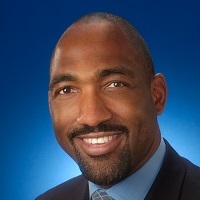Retirement was short-lived for former Eli Lilly CFO Derica Rice, who has joined CVS Health as president of the healthcare giant's pharmacy benefit management group CVS Caremark.
The role will position him on the other side of the negotiating table from his former employer and plenty of other pharma companies as a battle over drug pricing wages on. He's the second top Big Pharma ex to move into the payer world this month, following former GlaxoSmithKline CEO Andrew Witty, who's joining Optum, a UnitedHealth division that oversees its pharmacy benefits manager.
Rice, a 27-year Lilly veteran, will be tasked with leading sales and account management, operations, specialty pharmacy and more at the PBM giant, as well as driving strategy. As CVS Health COO Jon Roberts noted in a press release, the appointment comes as the healthcare industry increasingly looks for more value-based care. It also comes as CVS works to acquire health insurer Aetna in a $69 billion deal.

"We believe Derica is a great addition to our team, and the experience he brings with regard to innovation in these value-based models in particular will help us continue to serve our clients' needs while also developing and delivering innovative solutions and offerings," Roberts said in a statement.
In 2016, Lilly struck a pay-for-performance deal with Harvard Pilgrim for Trulicity that tied rebates to patients' blood sugar levels in exchange for a formulary upgrade.
Rice retired from Eli Lilly at the end of 2017. According to Morgan Stanley analysts, he was a candidate for Lilly's CEO job after John Lechleiter stepped down, but the company ultimately went with another insider, David Ricks. That announcement was in July 2016, and in June 2017, Rice announced his intention to retire. Rice said his time at the company was a "wonderful ride and I'm grateful for the opportunity."
RELATED: Lilly shake-up, the sequel: New CEO taps insiders to take reins from exiting execs
As industry watchers know, scrutiny on drug pricing has intensified in recent years, and Eli Lilly's important diabetes business has struggled in part due to PBM pressure. Last year, CVS excluded Lilly and Boehringer Ingelheim's Jardiance in favor of Johnson & Johnson's Invokana. At the time, a BI spokesperson said the company was "very disappointed" with the formulary move "and the potential treatment disruption and impact this could have on patients."
RELATED: CVS formulary knocks Lilly, BI's Jardiance in favor of Johnson & Johnson's Invokana
Amid pushback on prices, the pharma industry has said rebates and discounts to middlemen are growing, calling for patients to benefit from the negotiations. PBMs say their negotiations save the healthcare system billions of dollars and that drugmakers always set their list prices.
But in a battle between payers and pharma over list price hikes and growing rebates, patients are often caught in the middle because the amount they pay is based on a drug's list price.
Witty's move to UnitedHealth's Optum as CEO similarly puts the ex-GSK exec on the other side of the negotiating table. The company's leading pharmacy benefit management outfit, OptumRx, has announced its share of high-profile drug exclusions. And like Caremark, it's eyeing value-based deals as a way to team up with drugmakers to control costs. Last year, for instance, Optum teamed up with Merck on a "Learning Laboratory" to investigate value-based contracting. And OptumRx has inked at least one performance-based contract itself.
Witty has long been an advocate for fair pricing and access, having inked Glaxo's big Novartis asset swap that moved the London drugmaker more into lower-margin businesses such as consumer health and vaccines and away from pricey cancer drugs. Glaxo has since rebuilt in cancer, but at the time, Witty told CNBC the deal would help his company "not be fixated on defending ever and ever higher prices in the developed world."